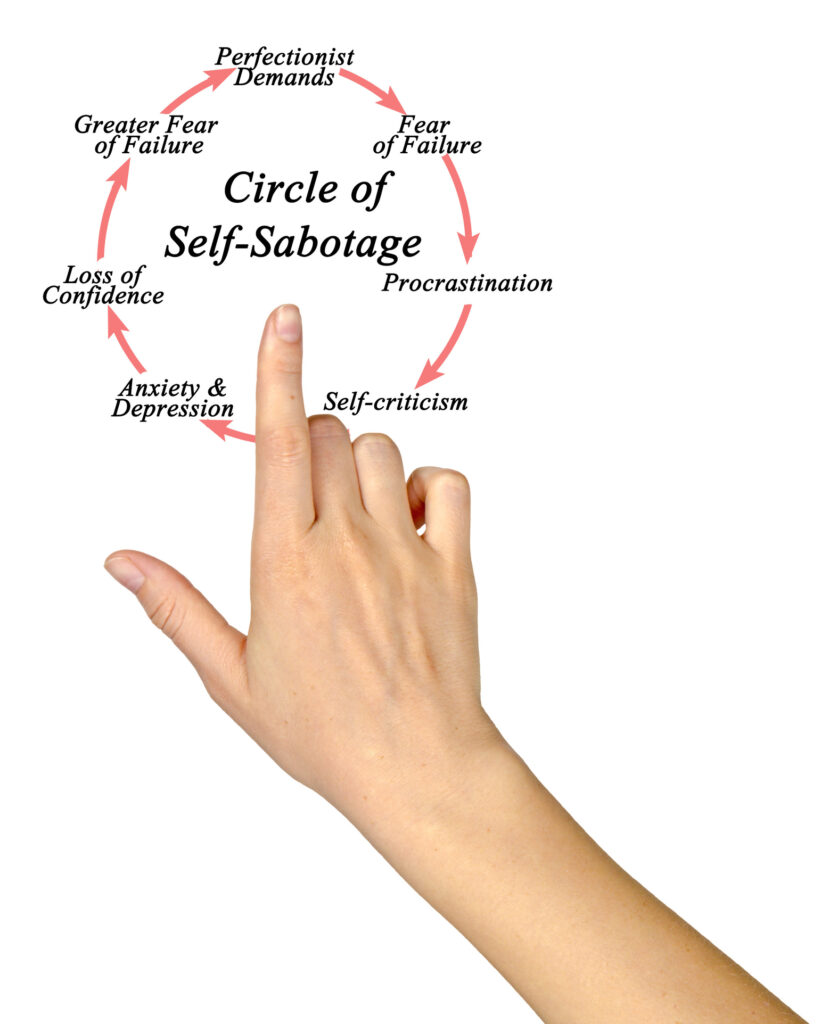Listen to Linda Milburn in action with Nova radio
Listen in on how she hypnotised Nat from the Nova Crew and one of her listeners in overcoming a bad habit
Let Linda personally help you overcome your bad habits, disorders or overwhelming problems
Dealing with Self-sabotage Through Hypnotherapy

Have you ever looked back on a bad choice and realized that the end result was all your own doing? Of course, you have. We all have. Self-sabotage is one of those things that make no sense, yet we keep on doing it, over and over, until we’ve torpedoed our relationships, opportunities and dreams. So why do we sabotage ourselves? The same reason we make mistakes and struggle to learn from them: Because we’re human. Thankfully, we’re also great at fixing our problems. And with a little help, we can live sabotage-free lives.
The first step to addressing our self-destructive tendencies is to face up to them and work to understand why we’re so keen to damage ourselves. By addressing the root causes behind why we self-sabotage, we can slowly work through them and start doing the things that benefit us rather than hurt ourselves.
In this post, we look at self-sabotage, what it is and how we can face up to it using effective treatments and tools like hypnotherapy to overcome those tendencies that break us down.
Why we self-sabotage
For some reason, most of us have a knack for doing things that hurt us – not by accident, but intentionally. These destructive behaviours and thoughts almost always leave us worse off, and they often tend to compound, growing more pervasive and serious until we buckle under their consequences.
What is self-sabotage?
Self-sabotage can afflict anyone and manifest as temporary behaviour or develop over the longer term, sometimes affecting people throughout their lives. It can hit us mentally, physically or emotionally, taking a significant toll on our perceptions of self-worth and confidence.
Self-sabotage is responsible for many problems, from burning bridges at work to blowing up years-long friendships and turning our backs on family. It’s only once the damage has been done that we realize we’ve actually done it to ourselves.
So why, then, do we self-sabotage? For many reasons. Guilt, anxiety, stress, trauma – are just a few of the deep-seated causes of self-sabotage. But things like low self-esteem and using sabotaging behaviour as a coping mechanism are often touted as the chief reasons behind this behaviour.
Where self-sabotage hurts us most
While self-sabotage is often defined as destructive actions or behaviour directed at yourself, it can also be seen as not doing things or avoiding important issues, leading us to suffer even more. Self-sabotaging behaviour occurs both intentionally and unconsciously, and it affects almost every aspect of our lives.
But it is on the mental health front where most of the damage gets done. Since the state of our minds determines our happiness and ability to cope with everyday issues, when we self-sabotage, the damage we do to ourselves is often far worse than if these problems arose because of external factors beyond our control.
These are just a few of the areas of our lives where self-sabotage hits us the hardest.
• Relationships – Whether it’s friends or family, self-sabotaging behaviour is especially hard on our relationships. When others see us self-destructing, they tend to avoid us, afraid that these tendencies may affect them, or because they believe we’re supposed to sort things out ourselves. This takes a heavier toll on our relationships, as self-sabotage is often misinterpreted and garners little sympathy.
• Our work & professional careers – People who self-sabotage at work often find themselves in hot water because many of these associated behaviours can affect our colleagues, the business and our direct work performance. This means that people seen as ‘self-saboteurs’ in the workplace are isolated and sometimes even fired.
• Ourselves – Possibly the area of our lives most affected by self-sabotage is our own sense of self-worth. Whenever we realize what we’ve done to hurt ourselves, our sense of self takes a hit. This leaves us feeling deflated, unmotivated and angry at ourselves all the time. As we look back on our self-sabotaging behaviour, we end up hating ourselves, leading to more destructive behaviours in the long term.
Using hypnotherapy to combat self-sabotage
Very often, people who suffer from self-sabotage struggle to explain what drives them to intentionally hurt or undermine themselves. While feelings of depression, anxiety and stress leave us feeling down and out, when we actively start behaving in a self-destructive manner, we kick off a pattern of self-abuse that can quickly spiral into a far bigger and more complex problem.
Don’t self-sabotage; self-service your mind
Hypnotherapy is an effective tool for addressing self-sabotage and turning the tables on that human tendency to implode. This is because self-sabotaging behaviours are almost always directly linked to something that can be addressed and dealt with in the mind.
Hypnosis and associated hypnotherapy techniques are designed to help people uncover and address problems and issues that precipitate self-sabotaging behaviour. These practices can teach people to develop effective exercises and routines that allow them to identify and avoid the behaviours that hurt them.
Stop self-sabotaging with Hypnocare
People around the world are discovering the power of hypnotherapy, not only for dealing with common mental health issues but also for problems like self-sabotage, pain management, and even interviewing for added confidence. At Hypnocare, our therapists are trained to help clients identify the things that trigger self-destructive behaviour and to learn to address them before they start hurting themselves.
Self-sabotage is easy to pick up and manage if you know how to deal with the issues triggering it. The therapists at Hypnocare can help you get there. Get in touch and stop self-sabotaging today!
CHANGE YOUR MIND AND CHANGE YOUR LIFE!
CALL NOW FOR A FREE 15 MIN CONSULT
CLINIC AND ONLINE SESSIONS AVAILABLE
Perth/Fremantle Call Linda 0409079435
Medical Disclaimer
Results will vary from person to person.
For More Information & Disclaimer: Full Medical Disclaimer Here
Hypnocare Hypnosis Clinic Fremantle
Linda Milburn
Located in Hilton, 3 min from Fremantle, WA.
Phone:
0409 079 435
08 9388 6322

Linda Milburn
Involved in Natural Healing for over 30 years
Fellow Member of the (AHA) Australian Hypnotherapist Association
Past SEO and Board Member of the AHA for 8 years
.

